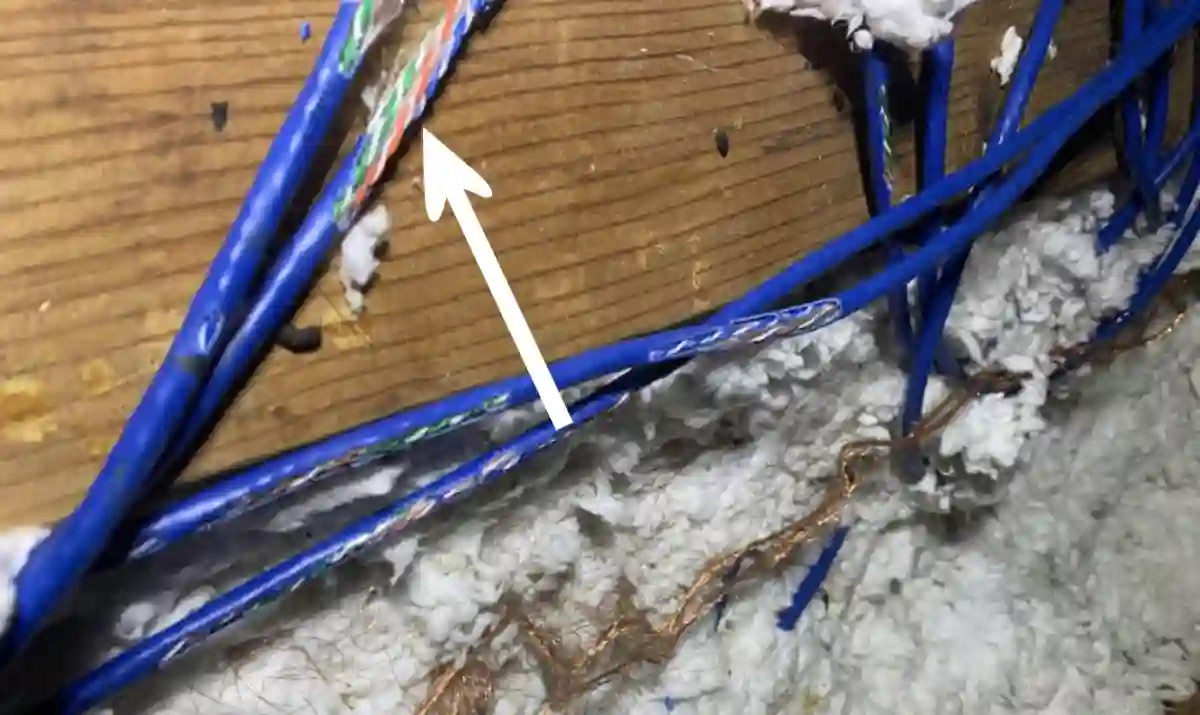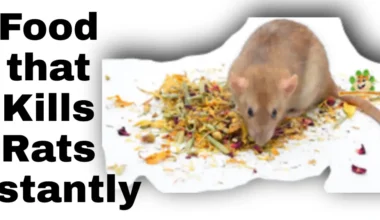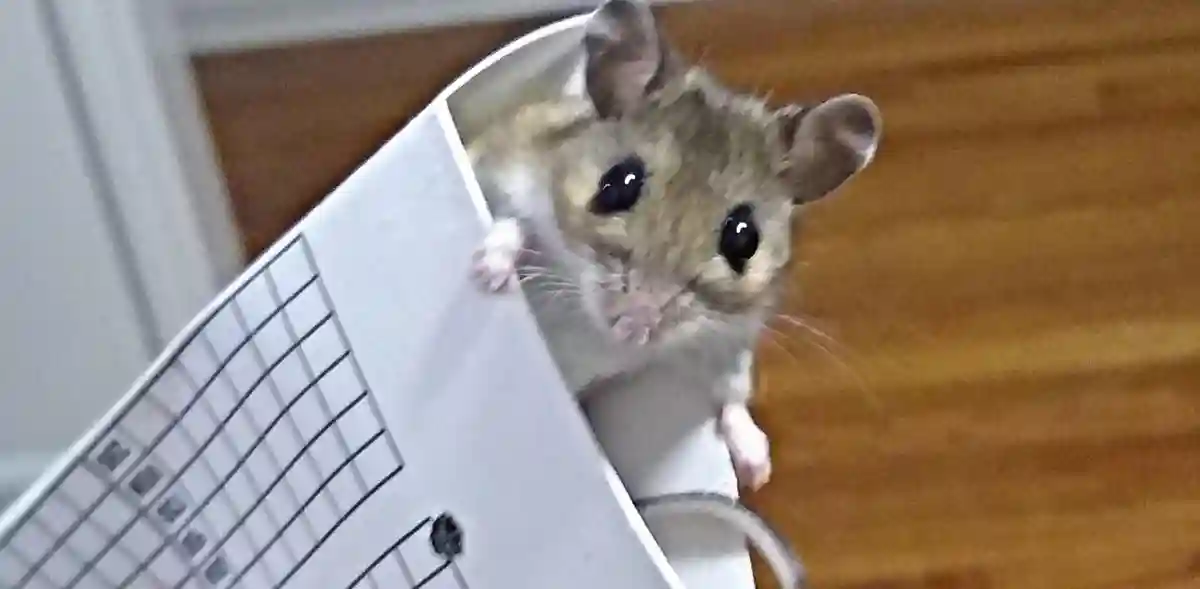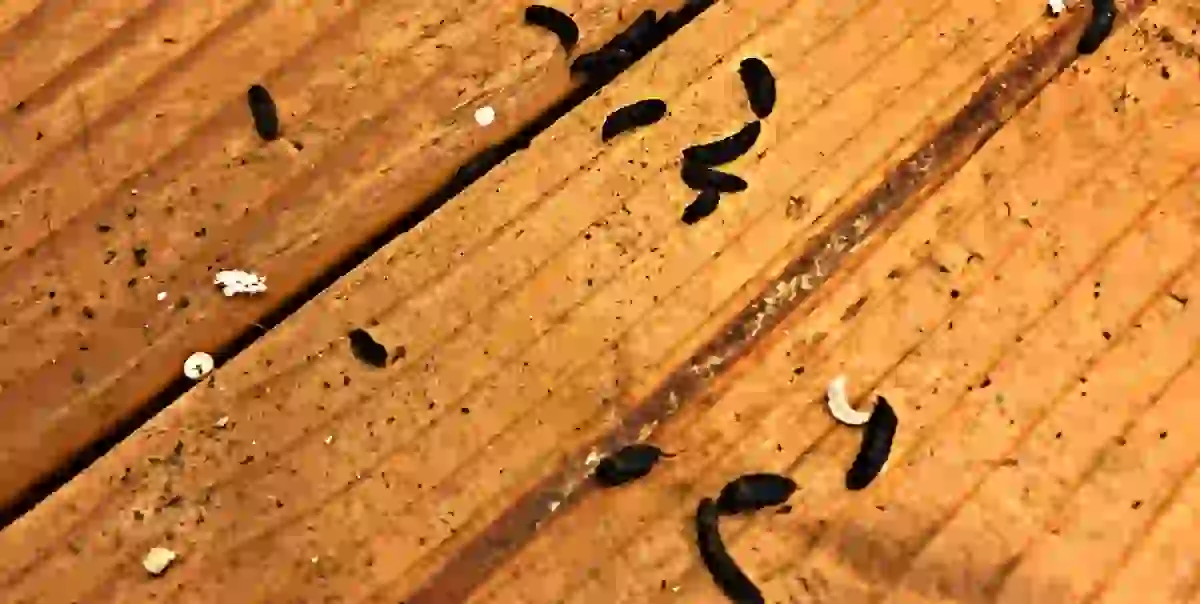Rats chewing wires in attics is a common occurrence due to their instinct to gnaw. The teeth of this pesky rodent are continuously growing, similar to how a cat scratches its claws or humans trim their fingernails. Gnawing helps rats keep their teeth in check. While they gnaw on various surfaces, they particularly seem to have a preference for electrical wires. This poses a significant problem as they often expose live wires, leading to heat generation in the attic’s wooden beams.
In fact, “it is estimated that 25 percent of all fires attributed to “unknown causes” are probably started by rodents gnawing on gas lines, electrical wiring and matches,” according to the Illinois Department of Public Health.
Based on the numerous instances of chewed wires I have witnessed, I wholeheartedly believe this statistic. I have also come across cases where rats have caused electrical shorts by chewing on wires. Homeowners have informed me about mysterious power outages on one side of their house, only for an electrician to discover chewed wires as the cause.
Additionally, I have encountered situations where alarm systems were triggered due to rats chewing on alarm wires.
If you have rats or any other rodents such as squirrels or mice in your attic, you need to address the problem promptly.
Causes of rats chewing wires in attic

Rats chew on attic wires and damage properties due to their constantly growing teeth, as mentioned earlier. By chewing on your attic wires, rats get rid of discomfort and maintain their teeth’s condition.
While this behavior may be bothersome to humans, it is inherent to rats, and preventing them from chewing on wires is virtually impossible without completely getting rid of them.
How to stop rats chewing wires in attic
Having known why rats chew on wires, below are steps to stop rats chewing wires in attic:
1. Determine if rats are the rodent
If you find yourself in the attic due to a malfunctioning light, a TV outage, or unsettling popping sounds when switching on a device, you may discover chewed wires in your loft. However, mice are not usually the culprits behind these chewed wires. The likely offender is a larger rodent, often a roof rat.
All rodents have a natural inclination to chew, so to effectively trap and remove the animal, it’s crucial to determine the specific type of rodent causing the problem.
Potential suspects in this scenario include squirrels, rats, and mice. By investigating other areas of your home, you can gather valuable clues to identify the troublesome critter. Keep an eye out for grease marks, as most animals leave stains over time, but rats are especially quick to leave markings. Rats also leave behind piles of droppings and urine puddles along their paths. Mice exhibit similar behaviors, but their droppings are no larger than a grain of rice, and grease marks from mice are uncommon.
Squirrels leave marks from body oils, but only after prolonged use. Their droppings may resemble those of rats, yet squirrels are much less elusive. If you have squirrels, you’ll likely hear them scurrying overhead or squabbling about food during the day. Squirrels also tend to take direct routes into and out of homes, rather than wandering through walls for extensive distances.
2. Identify their entry points
Unless you identify every entry point, your rat issue will remain unresolved indefinitely. Every single entry point needs to be identified. Missing even one spot could mean an unending rat presence in your house or attic. You must examine the entire structure, starting from the base to the top, encompassing all parts of the roof and plumbing system. Inspect vents, eaves, roof intersections, plumbing vents, air conditioning conduits, the chimney, and other possible points of access.
Be aware of what indicators to look for – things like brown smudges and grease at entry points, evidence of gnawing, and so on. Don’t forget to check the attic too, where you’ll likely find rat trails that can lead you to their entry points, as well as the damage they’ve caused that you’ll need to address, such as chewed wires or pipes. Sounds from the attic can also indicate areas of high rat activity.
3. Seal the holes
Ensure all entry points are sealed. Indeed, prioritize sealing them even if there are numerous rats presently inside the building. If you leave the access points open and then proceed to trap or expel the rats, the open holes will only continue to attract more rats, making the task unending.
Another key point to remember is that trapping rats becomes much easier once their exit routes are blocked off. Additionally, if your plan involves using a one-way rat door for exclusion, it’s imperative to secure all entry and exit points first.
4. Capture and eliminate the rats
First, traditional lethal snap traps can be utilized. Second, live cage traps are an option. Third, you could install a one-way funnel door exit on the main rat entry/exit hole, if you’ve managed to identify it. While I am concerned about being humane to all wildlife, dealing with rats – who breed at an extremely rapid pace, have short life spans, excellent memories, and strong gnawing capabilities – I must admit that I do employ lethal snap traps in the attic. I’ve found this approach to be most effective and it’s more humane than a slow, agonizing death through poisoning. Position the traps strategically along rodent pathways, not randomly.
The placement of traps is absolutely vital. The bait is not that important, but I do use peanut butter on my trap pans. The brand of the trap does matter and I prefer the old Victor wooden traps. Frequently check the traps and remove and dispose of any captured rats to prevent odor problems.
5. Clean and decontaminate your attic
After the rats chewing wires in attic have been removed, you need to remove smells in the attic. Rats and their feces can contribute to numerous health issues.
Rats excrete a potent pheromone scent which lures new rats into the attic. This scent is present in the urine and glandular secretions left by rats. It motivates new rats to chew their way into your attic, so eliminating this scent is imperative. Other creatures, such as snakes, are also attracted by this scent. Wearing full biohazard gear and a HEPA filter mask, vacuum the droppings, replace any soiled insulation, and treat the entire attic with a special enzyme-based cleanser to eradicate germs, pathogens, mold, and the smell of the excrement and urine.
Preventing rats from re-entering your attic
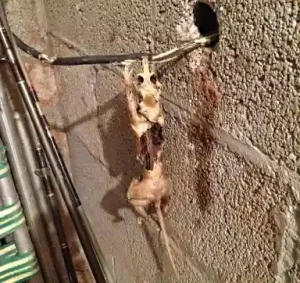
Do the following to keep rats out of your attic:
1. Keep your home clean
Rats prefer a secure place where they can forage, hide, breed, store food, and so forth. A building fits the bill perfectly. It offers warmth, dryness, and safety, and it’s close to food sources. This explains why rats are common in cities but rare in forests. To prevent rat infestation, follow these prevention steps:
- Remove clutter like garbage or compost heaps from your property.
- Seal all crevices with steel that lead into the house.
- Avoid leaving pet food or open garbage bins outside.
- Bird feeders and fruit trees can also attract rats.
- Having a pet cat or two may help, but I’ve seen rat infestations in homes with cats.
The following measures are not very effective:
- Planting or scattering mint leaves – this is a myth.
- Using rat repellents such as ammonia, mothballs, or cat urine.
- Using ultrasonic sound emitters.
- Using faux owls or hawk decoys.
2. Use rat poison
Using rat poison is arguably the worst approach to tackle rats chewing wires in attic. Not every rat will come across the poison, not all those that do will consume it (rats are remarkably wary), and not all that ingest it will perish (many have developed resistance, and they need to consume a lethal dose).
Even if the poison successfully kills some rats, new ones will continue to arrive. New rats may even be attracted by dead rat bodies. As long as there is sufficient space and available food, you’ll have rats.
While you may dislike rats and wish to eliminate them, poison results in a slow and agonizing death.
Also, if a rat dies from poison, it’s likely to die within your house, where it spends the majority of its time. Some poison vendors propagate a completely false myth that rats will go outside to die near water. A decomposing rat will cause a terrible stench throughout your house.
3. Place rat repellents
Not all repellent products are effective. Feel free to try different products, and when you realize these inexpensive tricks accomplish absolutely nothing, refer back to the first step at the beginning of this page.
Most of these repellents are made of naphthalene (mothball flakes) which do not work and only contaminate the environment, make your attic smell, or potentially harm your health. Other products may contain sulfur or coyote urine, which are the same gimmick ingredients used in all generic animal repellents.
Also, discard any products claiming to use “ultrasonic sound”, vibrations, or anything similar – these have been officially recognized as scams by the Federal Trade Commission.
Risk of rats in attic
Wherever rats are present, the risk of fire increases significantly. Chewed wires become exposed, and when combined with the constant flow of electrical current, sparks can easily ignite. When roof rats chew on wires, they remove the protective insulation that safeguards against such hazards.
Electrical issues are a leading cause of fires, with many of these problems stemming from rodent damage.
Address rat infestations promptly to eliminate the risk of a house fire.
Conclusion
The instructions above on removing rats chewing wires in attic are correct, but doing the job correctly is very difficult.
Engaging the services of a professional company specializing in attic insulation is highly recommended. These experts in rodent proofing ensure that rats and other rodents are unable to reenter your attic. This preventive measure can potentially save you significant amounts of money on property repairs over the years and, more importantly, safeguard your life. The risk of fire is substantial when wires are chewed, making it imperative to ensure the proper functioning and condition of your electrical wiring.
Read also: homemade toothpaste rat poison
